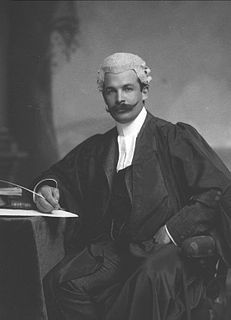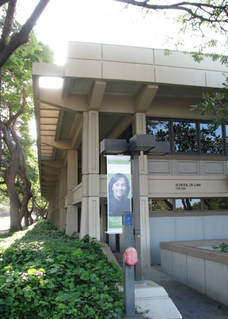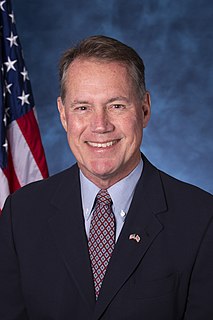
Edward Espenett Case is an American Democratic politician who is currently the U.S. Representative for Hawaii's 1st congressional district, which covers the urban core of Honolulu. He previously represented the 2nd district, which covers the rest of the state, from 2002 to 2007.

George Ariyoshi (born as Ryoichi Ariyoshi is an American lawyer and politician who served as the third governor of Hawaii from 1974 to 1986. A Democrat, he is Hawaii's longest-serving governor and the first American of Asian descent to serve as governor of a U.S. state. He assumed gubernatorial powers & duties when Governor John A. Burns was declared incapacitated in October 1973 and was elected in 1974, becoming the first Asian-American to be elected governor of a U.S. state or territory. His lengthy tenure is a record likely to remain unbroken due to term limits enacted after he left office. Ariyoshi is now considered an elder statesman of the Democratic Party of Hawaiʻi.
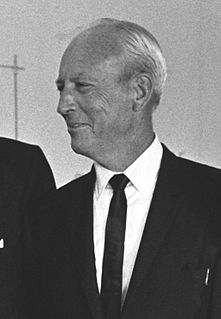
John Anthony Burns was an American politician. Burns was born in Montana and soon became a resident of Hawaii in 1923. He served as the second governor of Hawaii from 1962 to 1974.
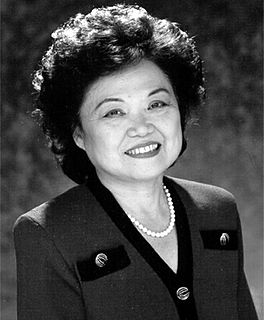
Patsy Matsu Takemoto Mink was an American lawyer and politician from the U.S. state of Hawaii. Mink was a third generation Japanese American and member of the Democratic Party. She also was the Assistant Secretary of State for Oceans and International Environmental and Scientific Affairs.
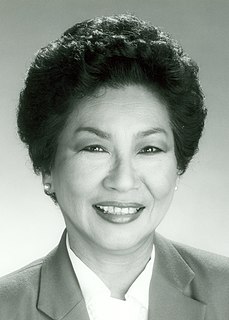
Patricia Hatsue Saiki is a Japanese American politician and former school teacher from Hilo in the State of Hawai'i. She served as a Republican in Congress from 1987 to 1991 and then as Administrator of the Small Business Administration under President of the United States George H. W. Bush.

The Lieutenant Governor of Hawaii is the assistant chief executive of the U.S. state of Hawaii and its various agencies and departments, as provided in the Article V, Sections 2 though 6 of the Constitution of Hawaii. Elected by popular suffrage of residents of the state on the same ticket as the Governor of Hawaii, the officeholder is concurrently the Secretary of State of Hawaii.

Nelson Kiyoshi Doi, was the fifth lieutenant governor of Hawaii from 1974 to 1978 in the first elected administration of Governor George Ariyoshi. Doi was a member of the Hawaii Democratic Party.
Simeon Rivera Acoba Jr. was an Associate Justice of the Hawaii State Supreme Court. Acoba served his first term from May 19, 2000, to May 18, 2010, and was retained by the Judicial Selection Commission to serve a second ten-year term from May 19, 2010, to May 18, 2020. He retired from the court effective February 29, 2014.

Muliufi Francis Hannemann is an American politician, businessman, and non-profit executive. He was elected twice as Mayor of Honolulu in 2004 and 2008. Hannemann has served as a special assistant in Washington, D.C., with the Department of the Interior, where he was selected for a White House fellowship in the Reagan administration under Vice President George H. W. Bush. He also served as chairman of the Honolulu City Council. He is the first person of Samoan descent and the second member of The Church of Jesus Christ of Latter-day Saints to serve as Mayor of Honolulu.
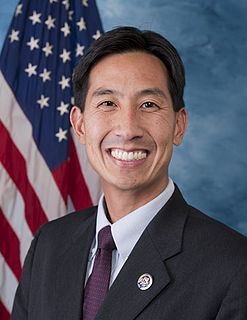
Charles Kong Djou is an American politician who served as the U.S. Representative for Hawaii's 1st congressional district in 2010–11. As a member of the Republican Party, Djou won his congressional seat in a May 2010 special election where the Democratic Party vote was split between several candidates, but was defeated in the general election in November after the Democratic primary provided a single opponent. Djou, who was previously in the Hawaii House of Representatives and the Honolulu City Council, was the first Thai American and the first Chinese American Republican to serve in the U.S. House of Representatives. In June 2016, Djou entered the race for Mayor of Honolulu, which he lost 48% to 52% to Democratic Party incumbent Kirk Caldwell. Djou left the Republican Party in March 2018.

Kirk William Caldwell is an American politician who is the 14th and current Mayor of Honolulu, Hawaii, since 2013. A member of the Democratic Party, Caldwell held the position of Acting Mayor of Honolulu in 2010 following the resignation of Mayor Mufi Hannemann.
Mahealani Perez-Wendt is a Kanaka Maoli poet, writer and community activist residing in Hawaiʻi, on the island of Maui. She is the 1993 recipient of the Eliot Cades literary award, and is the author of Uluhaimalama and other publications. She recently retired as the executive director of Native Hawaiian Legal Corporation, a public-interest law firm specializing in Kanaka Maoli rights. She has worked for Native Hawaiian Legal Corporation since 1978.

The 2012 United States Senate election in Hawaii took place on November 6, 2012, concurrently with the 2012 U.S. presidential election as well as other elections to the United States Senate and House of Representatives and various state and local elections. Incumbent Democratic U.S. Senator Daniel Akaka decided to retire instead of running for re-election to a fourth term. Democratic Congresswoman Mazie Hirono defeated former Hawaii Governor Linda Lingle in a rematch of the 2002 Hawaii gubernatorial election.
Jack Law is the owner of Hula's Bar & Lei Stand in Waikiki. With a long-standing business history in Hawaii; Law has been coined one of the most influential advocates for gay culture in Honolulu. While he has helped to create two of Waikiki's known nightclubs and bars: The Wave Waikiki and Hula's Bar & Lei Stand, he has also founded the Life Foundation and the Rainbow Film Festival, providing the publicized start of Honolulu's Gay and Lesbian culture. He has previously been appointed by Governors John Waihee and Ben Cayetano to the State of Hawaii Civil Rights Commission where he served for 8 years.
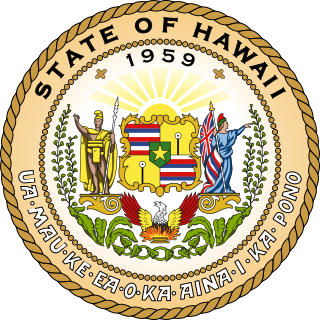
The United States House of Representatives special elections in Hawaii's 2nd congressional district, 2002-2003 occurred on November 30, 2002 and January 4, 2003 to select the successor to Patsy Mink (D) who had died from pneumonia. In accordance with Hawaiian state law, the special elections were officially nonpartisan and each held as single general elections without primaries.
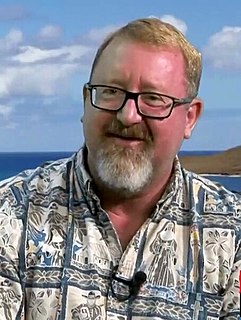
Bob McDermott is an American politician and a Republican member of the Hawaii House of Representatives since January 16, 2013 representing District 40. McDermott previously served three terms in the Hawaii House of Representatives from 1997 until 2003, but left to run to represent Hawaii's 2nd congressional district in the United States House of Representatives.
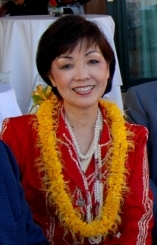
Lynne Kobashigawa Waihee was First Lady of Hawaii from 1986 to 1994. Born in Hawaii and married to the first Native Hawaiian governor of the state, she was raised in Kalihi. Educated at Andrews University, her first vocation was teaching. She used her position as first lady to raise the standard of children's literacy in Hawaii. She helped found a children's museum and was a role model for volunteer service in the community, instituting the First Lady's Outstanding Volunteers Program.


